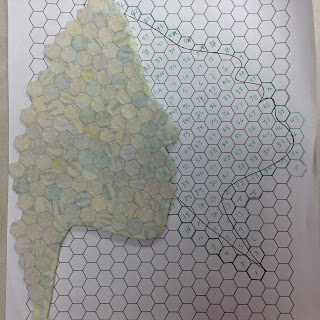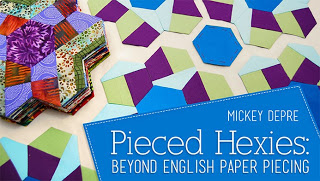74. English Paper Piecing Part 3: Connecting Hexies
It’s time to finish up our work with English Paper Piecing! Just in case you missed the other two posts, here’s some links to get you started:
Part 1 – Designing with tiny hexagons
Part 2 – Turning Hexagon Edges
Today we’re learning Part 3 – how to connect these little shapes together to form a pieced shape, and how to turn the edges to form an applique:
Now I caught the English Paper Piecing bug from an excellent Craftsy class with Mickey Dupre called Pieced Hexies. If you’re wanting more information about piecing hexagons and creating entirely new, scrappy hexagons, click here to get 33% off this fun class!
Connecting the hexagon shapes couldn’t be easier, however, you sometimes have to get creative about how to connect a huge number of these together. I would often take little tiny stitches through the seam allowance of a shape to get to the next corner so I could stitch along 2 edges to attach the next hexie.
The main goal here is simple: avoid breaking thread often as this creates more knots, more stops and starts, and it’s more time consuming than just figuring out how you can keep moving within the shape you’re creating.

Once you get the shape you’re looking for, in this case I was creating a large face shape, make a template and turn the edges exactly as we learned in turning large applique edges.
You will need to remove all the little papers out of the hexagons along the edge of the shape you are turning. I left in the papers in the center of the shape just to add to the body and keep it stiff and manageable while I was working with it.
After it’s all done and the edges are turned, then go through and pick out all the basting stitches and remove all the hundreds of little papers from the hexie shapes. This is a bit time consuming and tedious, but after finishing that step you will be DONE!
Now – is this the ONLY way you can piece with hexagons, even tiny hexagons? I had a slightly rude comment from the last part along the lines of “that is ridiculously complicated – you can do it much easier with x, y, z method.” (Don’t you just love the quilt police!)
My response to this type of thing is always the same: if you know an easier, faster, more fun and exciting method, USE it. Make a video and post it on YouTube and share it with everyone!
But do understand that there is never a single, golden way to create anything in quilting. There is no “right” or “wrong” method either. I’ve chosen to use this method, and yes, it’s time consuming, but it’s also a great project for travel or lazy days by the pool.
So enjoy getting addicted to piecing hexies, and remember to check out the Craftsy class Pieced Hexies with Mickey Dupre if you’re interested in learning even more variations on this super cool technique!
Let’s go quilt,
Leah Day


i am making the hexes for a quilt/or maybe a table cover. i'd like the outside edges to be the outline of the hexes. how do i accomplish that when i still have to put batting back on. what do i do about the edges? tx.
It looks like you're using a double strand of thread for both basting and whip stitching. Is there a reason for this? I can understand it would be a more sturdy method at the whip stitching point, but why for the basting? And I'm asking this with all due respect for your talent and expertise 🙂
For me, one of the fun parts of sewing is that there are usually several ways to reach the same outcome and that it's up to you which of the methods works best for you. So I totally agree with your sentiment!
wow love the tutorial on piecing a shape!! Thanks
I love it! And I'd 'almost' be willing to try your 1/4" hexies…lovely work and so nice you shared your entire process with everyone!!! Thanks much!
p.s. So glad you ignored the 'quilt police'! They need a real job!
I began making a Hexagon quilt several years ago, before Mickey Depre's book came out. A little tip I found to make taking the papers out easier. I use a hole puncher to punch holes in the template paper, freezer paper. When you are ready to take out the paper, use an orangewood stick (manicure stick) to poke through the hole, pop up the paper, easier than pulling the edges out.